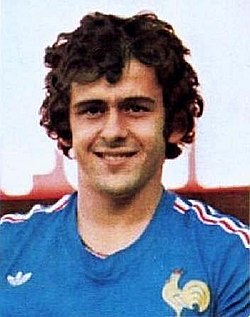| 1983 Ballon d'Or | |
|---|---|
 1983 Ballon d'Or winner Michel Platini in 1978 | |
| Date | 27 December 1983 |
| Presented by | France Football |
| Highlights | |
| Won by | |
| Website | francefootball.fr/ballon-d-or |
The 1983 Ballon d'Or, given to the best football player in Europe as judged by a panel of sports journalists from UEFA member countries, was awarded to Michel Platini on 27 December 1983. [1]
Contents
Platini was the second French national to win the award after Raymond Kopa (in 1958), and the third player from Juventus after Omar Sívori and Paolo Rossi (in 1961 and 1982, respectively). [2]